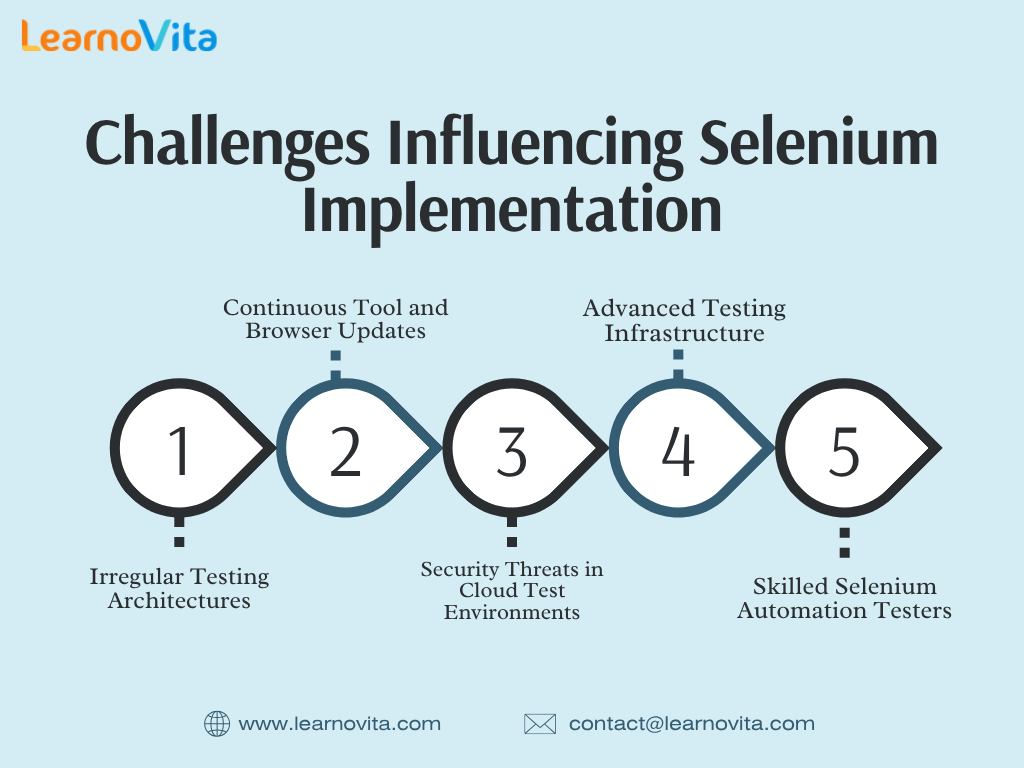Reimagining Automated Precision: Selenium Strengthening Modern Testing and Enterprise Quality Transformation
Introduction
Selenium professionals are reshaping enterprise software validation by integrating automation-focused programming techniques with advanced digital technologies to deliver accurate, scalable, and performance-oriented testing outcomes. As AI, automation, and intelligent testing platforms evolve, a Selenium Testing Course in Bangalore now emphasizes strategic mastery, continuous refinement, and user-centric validation capabilities. To stay competitive, organizations and testers must adopt progressive Selenium-driven practices that fuse innovation, architecture, and technology to enhance digital stability and testing excellence.

Key Trends Shaping the Progress of Selenium Training
Selenium advances through AI-powered automation, cloud-native testing, and evolved workflow models:
-
AI-Optimized Automation: Intelligent solutions increase accuracy, execution speed, and overall efficiency.
-
Shift Toward Microservices and Cloud-Ready Testing Models: Tools like Selenium Grid, Docker, and Kubernetes support scalable distributed validation.
-
Growth of Cloud-Based Automation Platforms: Services such as BrowserStack, GitHub, and Jenkins improve execution and collaboration.
-
Use of Standardized Automation Frameworks: Structures like TestNG and JUnit ensure consistency and reliability.
-
Rising Demand for Skilled Selenium Automation Experts: Certified testers help drive modernization with adaptive technical expertise.
Boosting Collaboration with Integrated Development Platforms
Modern Selenium engineers enhance collaboration through unified automation environments that streamline communication and workflow management. Systems like Jenkins, GitHub, Selenium Grid, and IntelliJ support version control, code reviews, and distributed test runs. Cloud-enabled pipelines, shared repositories, and synchronized testing processes enable accurate and efficient delivery. Analytical proficiency, tool expertise, and cooperative practices ensure alignment with enterprise testing goals.
Advancement of Enterprise Applications, APIs, and System Architecture
Selenium strengthens enterprise ecosystems by combining automation frameworks with structured testing strategies. Selenium WebDriver, Maven, TestNG, and Page Object Models support secure, scalable, and maintainable automation structures. Certified engineers implement systematic test approaches to improve system reliability, refine user experience, and sustain enterprise-level digital performance.
Growth of AI-Enhanced Development Intelligence and Automated Coding
AI and ML elevate Selenium automation through predictive analytics, smart locator strategies, and automated test script creation. Platforms such as GitHub Copilot, IntelliJ AI modules, and ML-driven optimizers reduce manual scripting and enhance precision. Behavioral data and performance insights help strengthen test effectiveness. Skilled testers use AI-led automation to simplify workflows, boost creativity, and deliver dependable, high-quality Selenium suites.
Expansion of Interactive and Multi-Platform Selenium Development
Interactive and cross-platform automation ensures unified validation across devices, browsers, and operating systems. Selenium WebDriver, Appium, Selenium Grid, and cloud-based execution platforms offer responsive and cohesive testing experiences. These integrated ecosystems support scalability, coordinated teamwork, and structured automation architecture. Certified Selenium testers leverage these tools to produce flexible, stable, and cross-platform automation solutions.

Automation and Selenium Integration for Scalable Software Delivery
Automation combined with Selenium improves the entire testing pipeline from script development to continuous deployment. CI/CD workflows, automated triggers, and dependency management increase speed, consistency, and reliability. Selenium Online Training programs deliver practical exposure to frameworks, automation platforms, and scalable testing practices. This combination forms predictable, efficient, and innovation-focused test environments for enterprise-grade delivery.
Challenges Influencing Selenium Implementation
Despite its strengths, Selenium automation presents several challenges:
-
Irregular Testing Architectures: Inconsistent structures can affect stability.
-
Frequent Browser and Tool Changes: Ongoing updates require continual learning.
-
Security Issues in Cloud-Based Testing: Distributed environments demand strong security practices.
-
Higher Costs for Modern Automation Ecosystems: Cloud tools require long-term planning.
-
Shortage of Capable Selenium Automation Engineers: Market demand exceeds current skill availability.
Conclusion
Selenium remains a crucial foundation for digital quality engineering, enabling enterprises to design, assess, and optimize secure and scalable applications. With advancements in AI-powered automation, cloud testing, and intelligent engineering technologies, organizations can maintain durable and efficient testing operations. Selenium Training in Bangalore equips learners with essential analytical and technical abilities to build scalable, collaborative, and high-performance automation solutions that support long-term digital success.
- Questions and Answers
- Opinion
- Motivational and Inspiring Story
- Technology
- Live and Let live
- Focus
- Geopolitics
- Military-Arms/Equipment
- الحماية
- Economy
- Beasts of Nations
- Machine Tools-The “Mother Industry”
- Art
- Causes
- Crafts
- Dance
- Drinks
- Film/Movie
- Fitness
- Food
- الألعاب
- Gardening
- Health
- الرئيسية
- Literature
- Music
- Networking
- أخرى
- Party
- Religion
- Shopping
- Sports
- Theater
- Health and Wellness
- News
- Culture

